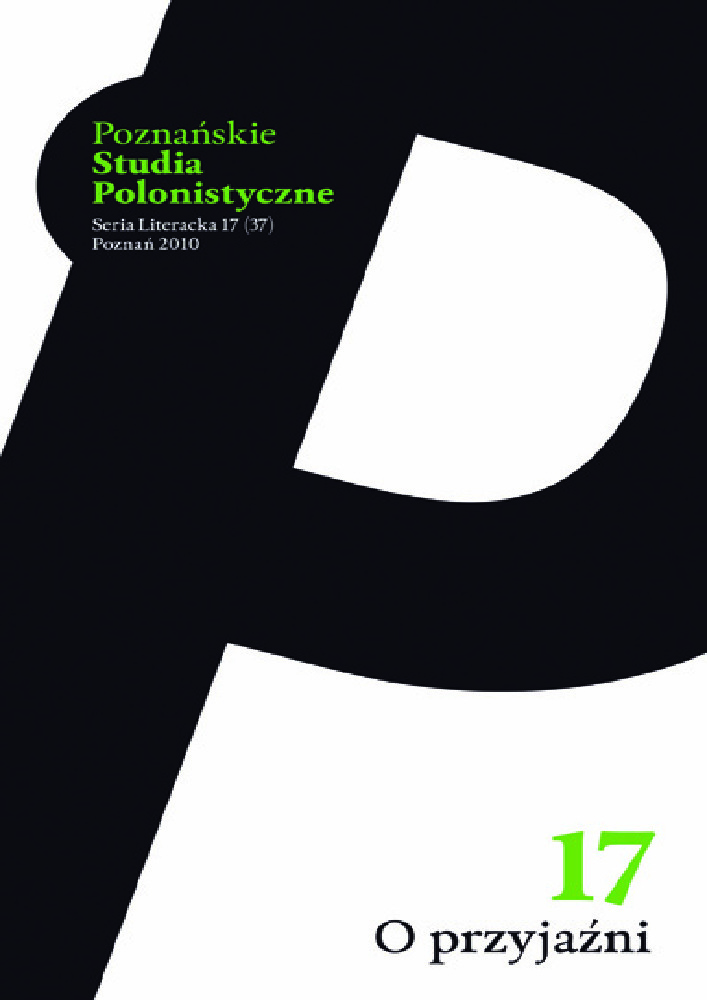Abstract
The article is a review of Krystyna Pietrych’s book Co poezji po bolu.
Empatyczne przestrzenie lektury (Łodż 2009) [What good pain and suffering
bring in poetry. Emphatic dimensions of reading]. Since the reviewed
book presents a bold and, to a large extent, novel approach to
personalistic reading — based on a subjective, compassionate experience
of an encounter with uncognizable and unreductible otherness of
tormented man-poet, the reviewer focuses on the issues viewed as the
most important for the method of emphatic reading adopted by the author.
E. Winiecka analyses aesthetical and epistemological, as well as
axiological possibilities and risks that emphatic criticism opens up for
reexamination. Formulates her own opinion on the analytical method
used by K. Pietrych in examining poetry, which is a recording of one’s
mind in agony and suffering experienced by seven authors: Aleksander
Wat, Zbigniew Herbert, Miron Białszewski, Stanisłw Barańzak, Janusz
Szuber, as well as Julian Przybośand Anna Swirszczyńka. Outlines
the methodological perspectives of the discussed work that traces
the stages in the formation of literary depiction and representation of
suffering. The text is also an attempt at defining and indicating the cognitive
perspectives of emphatic criticism.
References
Balbus S., Znaki róży (O poezji Juliana Przybosia), w: Od tematu do rematu. Przechadzki z Balcerzanem, red. T. Mizerkiewicz, A. Stankowska, Poznań 2007, s. 345–376.
Barańczak S., „Poezja musi być wieczną czujnością” [rozmowa z P. Wierzchosławskim], w: Zaufać nieufności. Osiem rozmów o sensie poezji 1990–1992, red. K. Biedrzycki, Kraków 1993.
Biela P., Einfühlung jako dialogiczność personalizmu fenomenologicznego Edith Stein, „Czasopismo Filozoficzne” 2009, nr 4/5.
Brach-Czaina J., Szczeliny istnienia, Warszawa 1992.
Caputo J.D., Against ethics: contributions to a poetics of obligation with constant reference to deconstruction, Bloomington 1993.
Cixous H., Coming to Writing and Other Esseys, red. D. Jenson, wstęp S. R obin Suleiman, Cambridge 1991.
Davis M.H., Empatia. O umiejętności współodczuwania, przeł. J. Kubiak, Gdańsk 2001.
Głowiński M., Ekspresja i empatia. Studia o młodopolskiej krytyce literackiej, Kraków 1997.
Husserl E., Zagadnienie wczucia, przeł. D. Gierulanka, komentarz J. Tischer, „Znak” 1974, nr 3, s. 319–327.
Kristeva J., Potęga obrzydzenia. Esej o wstręcie, przeł. M. Falski, Kraków 2007.
Łebkowska A., Empatia. O literackich narracjach przełomu XX i XXI wieku, Kraków 2008.
jako doświadczenie, red. R. Nycz, A. Zeidler-Janiszewska, Kraków 2006.
Nycz R., Wprowadzenie. Kulturowa natura, słaby profesjonalizm. Kilka uwag o przedmiocie poznania literackiego i statusie dyskursu literaturoznawczego, w: Kulturowa teoria literatury. Główne pojęcia i problemy, red. M.P. Markowski, R. Nycz, Kraków 2006, s. 5–40.
Ortega y Gasset J., Dehumanizacja sztuki i inne eseje, przeł. P. Niklewicz, wybór, wstęp S. Cichowicz, Warszawa 1980.
Pietrych K., Co poezji po bólu. Empatyczne przestrzenie lektury, Łódź 2009.
Płuciennik J., Literackie identyfikacje i oddźwięki. Poetyka a empatia, Łódź 2004.
Przyboś J., Linia i gwar, Kraków 1959.
Ratoń K., Poezje, oprac. J.Z. Brudnicki, Warszawa 2002.
Skwarczyńska S., Od przełomu antypozytywistycznego do roku 1945, w: Teoria badań literackich za granicą, t. 2, cz. 1, Kraków 1974.
Stein E., O zagadnieniu wczucia, przeł. D. Gierulanka, F. Gierula, Kraków 1988.
Wat A., Pisma zebrane, t. 1, Poezje, oprac. A. Micińska, J. Zieliński, posłowie J. Zieliński, Warszawa 1997.
Worringer W., Abstraction and Emphathy. A Contribution to the Psychology of Style, przeł. M. Bullock, London 1953.
License
Authors
Authors of texts accepted for publication in „Poznańskie Studia Polonistyczne. Seria Literacka” are required to complete, sign and return to the editor's office the Agreement for granting a royalty-free license to works with a commitment to grant a CC sub-license.
Under the agreement, the authors of texts published in „Poznańskie Studia Polonistyczne. Seria Literacka” grant the Adam Mickiewicz University in Poznań a non-exclusive, royalty-free license and authorize the use of Attribution-NoDerivatives 4.0 International (CC BY-ND 4.0)Creative Commons sub-license.
The authors retain the right to continue the free disposal of the work.
Users
Interested Internet users are entitled to use works published in „Poznańskie Studia Polonistyczne. Seria Literacka” since 2016, for non-commercial purposes only, under the following conditions:
- attribution - obligation to provide, together with the distributed work, information about the authorship, title, source (link to the original work, DOI) and the license itself.
- no derivatives - the work must be preserved in its original form, without the author's consent it is not possible to distribute the modified work, such as translations, publications, etc.
Copyrights are reserved for all texts published before 2016.
Miscellaneous
Adam Mickiewicz University in Poznań retains the right to magazines as a whole (layout, graphic form, title, cover design, logo etc.).
